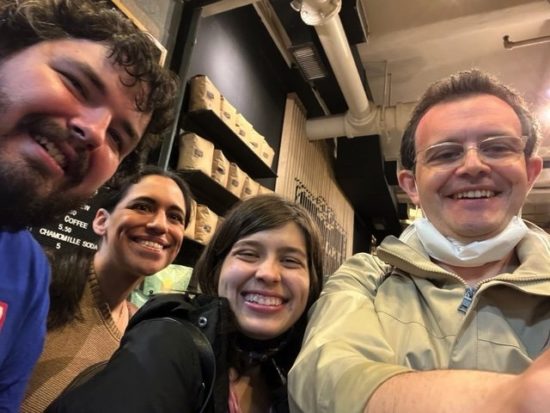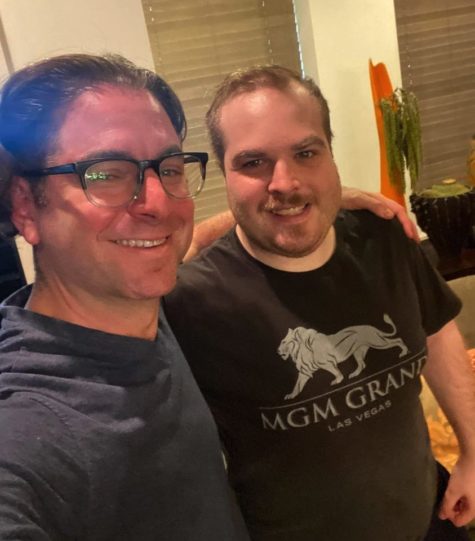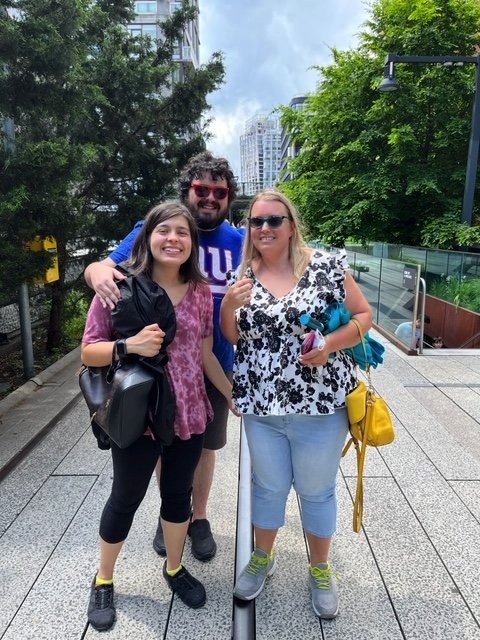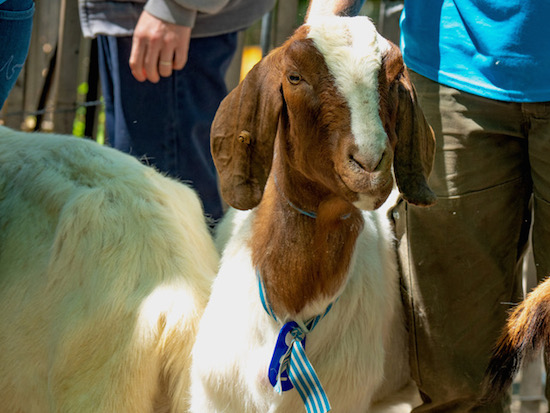
By Sara Lewin Lebwohl
The hit Netflix show, Love on the Spectrum, has shown the world that people with autism are dating and finding loving relationships.
“It’s really putting the message out there that everything is possible,” said Jeremy Hamburgh, founder of My Best Social Life, a social skills program and online community for autistic people looking for friendship and love.
“The show helps people, even my own family, understand why I love being an autism dating and friendship coach,” he said.
Jeremy, a former assistant district attorney in the Bronx and in-house counsel for JPMorgan Chase Bank, started working with the autism community as a “side passion project.” An Upper West Sider, Jeremy became a mainstay in the JCC Manhattan, where he ran dating workshops for both typically abled and special-needs adults.

Jeremy’s transition from lawyer to full-time autism friendship and dating coach began in 2019, when one of his special-needs clients, Douglas, got married, and Jeremy gave a blessing to the bride and groom at the ceremony. Jeremy had found his calling, and put his skills to new use.
Through his work in the JCC’s Adaptations program, Jeremy found that he was able to break down socializing into simple systems and data points. “That’s the magic,” he said. “It’s taking something seemingly abstract, like conversing or flirting, and turning it into a formula or system, which is a lot more intuitive for many neurodiverse people.”
Jeremy emphasizes data over drama. “If you ask someone with autism where they are struggling in their social life, they will tell you their story, and there’s often a lot of drama involved,” he said. “I offer them a more objective way to understand why they’re struggling.
“Are they spending enough time in social situations? Are they meeting enough people? Are the conversations fizzling and falling flat? When someone on the spectrum comes to us for help, our first conversation is a really objective look at where they’re getting stuck, because that allows us to figure out their next steps,” Jeremy explained. There are free trainings on the website, which can lead to enrollment in the program for a fee.
After experiencing rejection time and time again, some of Jeremy’s clients ask, why try again? His goals are for them to feel included in the community, while learning skills and cultivating confidence and a mindset of empowerment. His mantra for his clients is, “Sometimes you win and sometimes you learn. There are no defeats.”
Joshua Wigler, is autistic and grew up on the UWS, attending school at Parkside, PS 75 and PS 87. He describes his experience growing up neurodiverse as “difficult,” but has found success with the My Best Social Life program.
“I haven’t always known how to read social cues or stay on topic in many conversations. For dating, it can be hard to convey any romantic feelings to a potential romantic partner, let alone to approach someone who could be a good match for myself,” Joshua said.
Learning how to prepare himself for any social situation, in terms of how to find the right social scene, how to dress, how to approach potential friends and romantic partners, and, most importantly, how to connect through conversation, have been valuable skills for Joshua, and they’ve paid off.
Joshua’s first big accomplishment was landing a date in 2021 and turning it into a relationship. They broke up after a few months, but with a can-do attitude and some additional coaching, Joshua recently met another woman with whom, he confides, he has shared a kiss.
To be socially successful, Jeremy explains, there are basic steps. “You have to know what you want in your life, who your tribe is and who you are compatible with, where to find those people, have a plan for what to ask and say, and, finally, have the right mentor,” Jeremy says.
Ilana Frank, who coaches alongside Jeremy, has lived on the Upper West Side for the past 16 years, and has also been a New York City public school teacher for the last 16 years with an emphasis on students with special needs.
“I interact with people and families on a daily basis that are touched by neurodiversity. Whether it’s a student on the spectrum, or someone in the Upper West Side Jewish community who is on the spectrum, or a parent or sibling, almost everyone has a story about what autism means for them,” said Ilana.
Many other places in the world are becoming more inclusive of autistic people, and leveraging their “superpowers.” For example, there are special workplace programs that can help an autistic person thrive.
“One of my clients landed a job working in the JP Morgan Chase mailroom, because the job speaks to his strengths in organizing and sorting. Autistic people can absolutely thrive in the workplace, particularly in jobs that involve repetition, because so many neurodiverse people excel when they find their rhythm.” Jeremy said.
The skills learned through My Best Social Life can apply to all aspects of life, and Jeremy is watching his community grow in new and unexpected ways. For example, his mailroom client is being considered for a management position within the company. Another client planned a trip to the High Line for their community that drew people from three states.
“I read a quote that socializing with autism is like baseball: There’s a lot of swings and misses but when you connect, it’s a home run. And that’s exactly what we see in our clients’ lives,” Jeremy said.
For more information about My Best Social Life, visit: https://mybestsociallife.com/










Jeremy’s program provides the coaching, tips, skills and encouragement that is needed for young people on the spectrum to be successful in initiating/maintaining/growing relationships. The parents, who provide important support for their offspring, are also an essential part of this program. In short, this program provides coaching, skill acquisition, support and positive results
Incredible program. Serving much-needed support to this community.
Such an amazing and important program. We all deserve love!
I love guys story, and what a fantastic program!!
Love the concept that this program is built on!! Great info!!
Thank you, Jeremy, for filling such an important gap in the neurodiverse community
The program modules and weekly client-member meetings work in tandem to keep you focused and encouraged to get out there and make new connections, and one-on-one mentoring sessions help keep you on-track with valuable feedback and insights. If you know someone on the spectrum with limited social opportunities, chances are they’d benefit greatly by joining us :0)